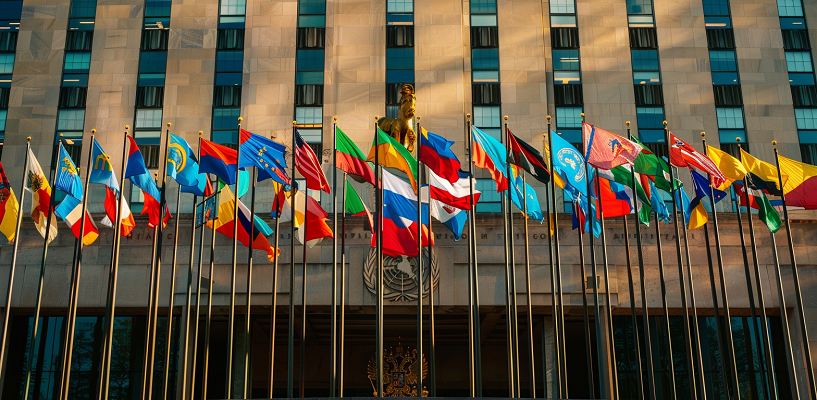- Home
- >>
- USA
- >>
- Politics
- >>
- International
- >>
- What is a Sanction ?
What is a Sanction ?

If a nation imposes several restrictions under different subjects over a nation, then combinedly these are called Sanctions.
Usually, sanction is only removed if the party in question agrees to the terms and conditions set forth by the sanctioning party (or parties) and is prepared to fulfil all of the requirements. This is done in an effort to force the sanctioned entity to alter a certain behaviour (or collection of behaviours) by applying pressure on them diplomatically, economically, trade-wise, and politically.
US sanctions against Iran, Russia, Syria, Venezuela, and other opponents have been applied and tightened in recent years. Unilateral sanctions applied by individual nations to further their international goals should not be mistaken with UN sanctions.
In accordance with the Foreign Terrorism Sanctions Regulations, 31 CFR Part 594 (GTSR), or the Foreign Terrorist Organisation Sanctions Regulations, 31 CFR Part 597 (FTOSR), which include Hamas and Palestinian Islamic Jihad (PIJ), the Office of Foreign Assets Control (OFAC) continued in using sanctions to forbid US citizens from transacting with individuals or groups that are blocked.
As per the provisions of Chapter VII of the United Nations Charter, the exclusive authority to impose sanctions (Article 41) rests with the UN Security Council, and all UN member states are obligated to adhere to it (Article 2,2).
Similarly, the EU utilises sanctions as one of its tools in terms of the Common Foreign and Security Policy (CFSP). They enable the EU to act in times of conflict prevention, crisis management, promotion of peace, democracy, and the rule of law, as well as to ensure the protection of human rights and international law. The EU can put in limiting regulations as its own initiative or to carry out UN Security Council resolutions.
According to a study by the Peterson Institute for International Economics, less than 20% of times have penalties worked as intended. For instance, according to Griswold, the “US Nuclear Proliferation Prevention Act of 1994”, was unable to stop nuclear weapons tests by Pakistan and India.
Dursun Peksen, a sanctions specialist at the University of Memphis, estimates that roughly 40% of the time, economic sanctions cause the targeted nation to alter its behaviour significantly.
How many types of Sanctions ? -
- Constraints on financial
- Prohibitions on imports/exports of weapons.
- Prohibitions on the import/export of products, software, and technology with both military and commercial uses.
- To forbid citizens from transacting financially with the people, organisations, or governments on the “inhibition list” unless they obtain a licence from the government that is punishing them.
- Ban against investing or conducting business without a licence in a sanctioned nation.
What is the Purpose of a Sanction ? -
The first type comprises sanctions that seek to require conformance to international law.
The second set of concepts includes sanctions meant to deter a threat to peace within a certain geographic area.
The United Nations Security Council’s rejection of a particular action or policy of a member or non-member country falls under the third category.
What is a Sanction List ? -
A sanction list is a catalogue of people, organisations, or nations that have been placed under restrictions or sanctioned by sanctioning nation. The lists are published by government bodies or agencies.
A sanction list is a comprehensive register that is vital to the battle against international unlawful operation, since it helps identify individuals, organisations, and governments engaged in unlawful activities. This facilitates risk assessment, and enforces severe restrictions for sanction violations.
The Office of Foreign Assets Control (OFAC) of the US Department of the Treasury offers a free internet service to allow users to simultaneously search all of its sanctions lists.
In order to achieve objectives related to foreign policy and national security, OFAC supervises several sanctions programmes, such as “the blocking of funds” and trade bans.
How Sanctions are Imposed ? -
In the US, the U.S. Department of Commerce’s “Bureau of Industry and Security (BIS)” is largely responsible for administering export restrictions, whereas the Office of Foreign Assets Control (OFAC) of the U.S. Department of Treasury is principally in charge of financial/economic sanctions.
In the EU, the Council of the European Union makes decisions about sanctions by consensus, based on recommendations from the High Representative of the Union for Foreign Affairs and Security Policy, and following deliberation in the pertinent Council committees. The Council action becomes operative as soon as it is published in the EU’s Official Journal.
Following Brexit, the UK is free to conduct its own sanctions programme in accordance with its foreign policy goals.
In a statement released on March 25, 2022, the EU expressed the Union’s condemnation of the DPRK’s (Democratic People’s Republic of Korea) intercontinental ballistic missile launch on March 24, 2022, which violated several UNSCRs (United Nations Security Council
Resolution) and posed a severe threat to regional and global peace and security. Considering the ongoing ballistic missile-related activities, the EU added 8 people and 4 entities to its lists of natural and legal persons, entities and bodies that are subject to restrictive measures.
In response to international threats, the Security Council, which is the UN’s main crisis management body, may choose to break economic links with both state and nonstate organisations. Resolutions pertaining to sanctions must have a majority vote in the fifteen-member council and not be subject to a veto from any of the five permanent members, which are the US, Russia, China, France, and the UK. There are fifteen sanction regimes in place as of February 2024, with the main goals being the fight against terrorism, nuclear non-proliferation, and political dispute resolution. Eleven monitoring groups, panels, and teams assist the work of 12 out of the 15 sanctions committees.
UN Member States are not permitted to grant DPRK nationals working permits within their territorial limits, nor are they permitted to renew expired permits, as per UN Security Council resolution 2375. The money made from DPRK personnel working abroad goes towards funding Korea’s nuclear weapons and ballistic missile projects, as stated in UN Security Council resolutions 2321, 2371, and 2397. For instance, Yanbian Silverstar Network Technology Co., Ltd., a Chinese technology company, was singled out for penalties by the US in 2018. In actuality, North Koreans supervised and controlled this company, which was officially a Chinese IT firm.
What is a Sanction in War ? -
As a result of the Russo-Ukrainian War in 2022, the US, Canada, Japan, the EU, and other nations levied diplomatic and economic sanctions on Russia. Following the sanctions, Russian imports from the West dropped leading to an increase in the supply of Russian oil and gas to the Asian nations, particularly China and India. Competent sanctions against Russia have, according to Jeremy Garlick, profited the country’s economy inadvertently.
As of February 2024 accordance with “bbc.com”, the UK has prohibited six Russian “prison administrators” from entering the country and frozen their assets. Additionally, the UK has put fresh restrictions on Russian energy, metal, and diamond exports. More than 60% of Putin’s war chest (approximately $350bn) has been frozen by UK sanctions. The European Union has imposed restrictions on two hundred individuals and groups that it claims are assisting Russia in obtaining armaments or removing Ukrainian children from their residences. The EU also seized almost 70% of the property of Russian banks.
According to a New York Times investigation, there is also growing concern that Russian businesses could use cryptocurrency resources, such ransomware and the so-called “digital ruble,” to avoid sanctions.
Under the terms of the Executive Order (E.O.) 13224, the Foreign Terrorist Organisations Sanctions Regulations, 31 CFR part 597 (FTOSR), the Global Terrorism Sanctions Regulations, and 31 CFR part 594 (GTSR), as modified — OFAC has released six General Licenses (GL) — 14, 15, 16, 17, 18, 19, and 20. These GLs permit specific transactions and operations that are incidental and required to maintain the flow of humanitarian aid and other initiatives to serve the Afghan people, including those involving the Taliban and the Haqqani Network. Under E.O. 13224, the Taliban and the Haqqani Network have been identified as Specially Designated Global Terrorists (SDGTs). Additionally, section 219 of the Immigration and Nationality Act designates the Haqqani Network as a Foreign Terrorist Organisation.
That’s all friends.

